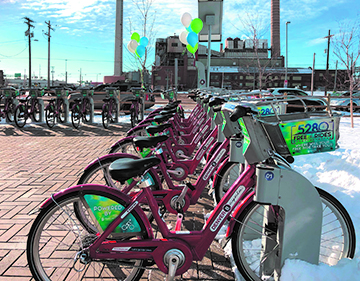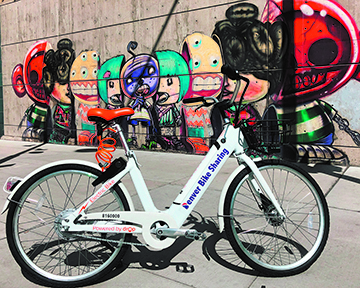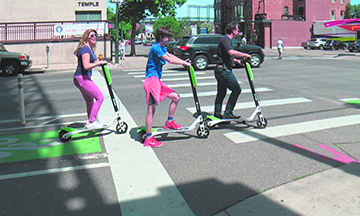Public Works Scrambles To Find A Substitute; The City Is Also Ending Its Electric Scooter Program
by Glen Richardson

Despite a 2020 Denver bike lane budget of $11 million, another $4 million for bike safety plus $3 million for “high-comfort” bike lanes on 18th and 19th Streets, Denver B-Cycle is shutting down on January 30, 2020, and won’t be replaced any time soon.
The company’s exit from Denver will take 737 publicly available bikes off the street at the end of this month.
Moreover, the city is also ending its electric scooter permit program and hoping to replace it with a system where scooter and shared bike providers will compete for a city contract.
Bid Peddling
Denver Public Works is now in the process of looking for a new company to operate bike and scooter services through a competitive bidding process that isn’t expected to be completed until the middle of this year. That means months are likely to pass between the end of B-cycle availability and the debut of a new system.
Amid competition from electric scooter and bike companies, dwindling ridership and shallow revenues — the city peddled 5,280 annual bike-share passes for free to incentivize biking instead of driving —many are questioning if the B-cycle era can make a comeback.
City government has helped fund the bike-share system but did not operate it, and it will not run one in the future, according to Mike Strott, a spokesman for the Mayor’s Office. In the first six months of Denver’s sanctioned dockless transport program, six e-bike and e-scooter companies combined to average about 5,100 trips a day.
Cost Cutting

By issuing a request for proposals from private bike-share and scooter-share companies to operate in Denver, Public Works hopes the system will be less costly. The contracts will replace the permitting system that has allowed companies like Lime and Jump to operate.
The competitive bidding process “will help Denver better manage and coordinate the delivery of these commercial operations and help ensure the city partners with the most qualified operator(s) to further its mobility goals,” according to a DPW statement. A decision on who will operate the program(s) won’t be made until at least this summer, Pubic Works admits.
But even if Public Works is able to get a new company or companies by this summer, getting a new bike share system up and running could take several more months. That, many observers including bikers, worry will make the delay even more lengthy. Upshot: Such a wide gap in service is likely to push B-cycle users into buying cars. Moreover, many families used B-cycle so they would only need one car.
Dated System

Denver’s B-cycle bikes and docking stations needed to be replaced. Many dated to when the system was launched in 2010, according to Mike Pletsch, executive director of Denver Bike Sharing, the nonprofit that runs B-cycle. But the organization doesn’t have the money to replace the equipment or renew its contract with Trek, the bicycle manufacturer that developed the system.
“The continued aging of the system and the cost to work with B-cycle is too high for us,” he said. “The funding is just not there to do it.”
The organization’s 2018 budget totaled $1 million, according to its annual report. The city provided it with $800,000 in 2019, and about half of that was dedicated to a program that handed out the 5,280 free passes.
Falling Ridership
B-cycle ridership has been falling steadily since its peak in 2014. The system’s riders took 377,000 trips that year compared with 305,000 in 2018, a 19 percent decline, according to the annual report. The decrease in riders corresponds roughly with the rise of ride-hail services like Uber and Lyft, and the arrival of dockless scooters and bikes last year.
But Denver’s bike share system has never had the high number of stations needed to reach high ridership levels, like those in Paris, New York, or Mexico City. According to the National Association of City Transportation Officials, successful systems provide 28 stations per square mile. Denver B-Cycle had about a half-dozen per square mile.
“We’ve got 89 stations currently and there certainly needs to be more,” says Pletsch. Those docking stations are spread out over seven neighborhoods and host the system’s 716 bikes.
